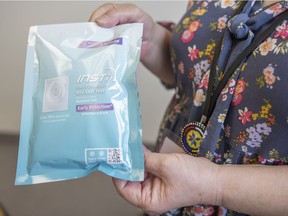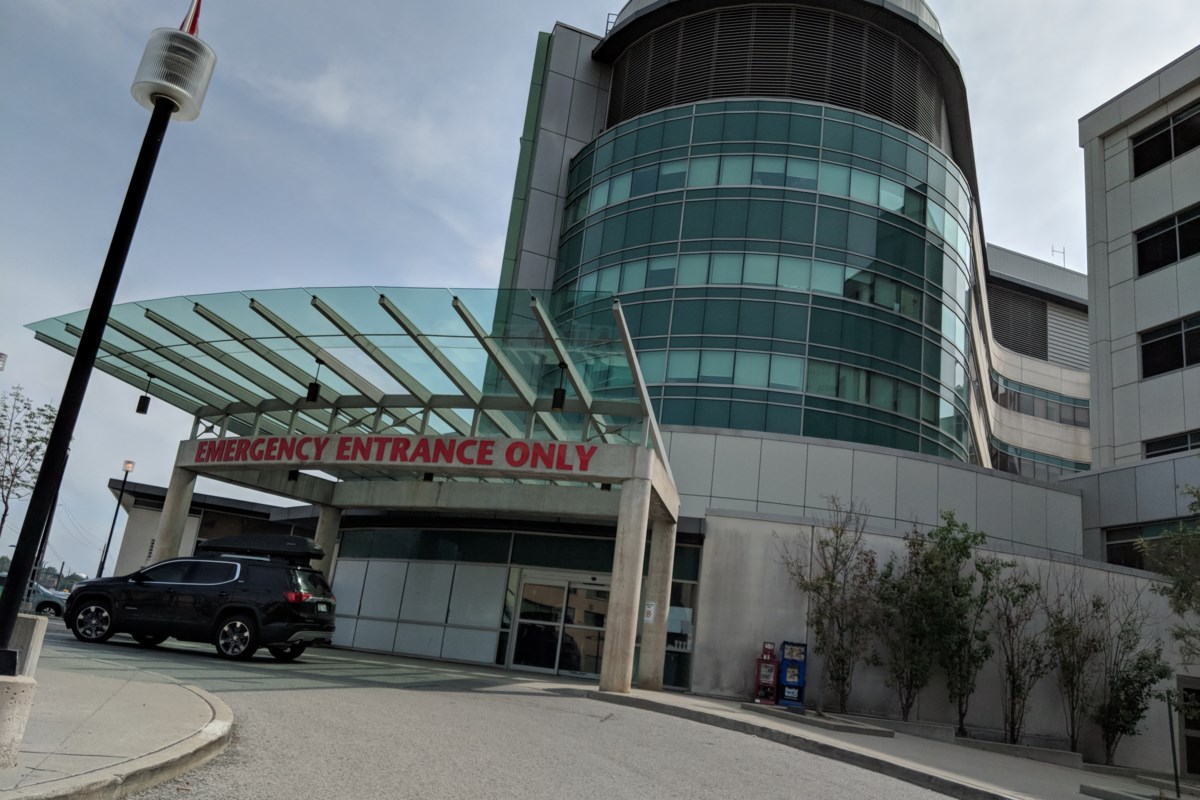Health
Organizations say free self-test HIV kits are a "huge step forward" – Regina Leader-Post

The tests are available at 23 locations with several spots in La Ronge, North Battleford, Prince Albert, Saskatoon and Regina.
Article content
That’s what Vidya Reddy, education and information specialist with APSS, said of the government’s announcement this week to give out free kits at 23 locations. He hopes they can meet the demand and ramp up distribution if needed.
“We are very, very happy with the fact that they’ve made these test kits available across the province,” said Reddy. The tests are 99.5 per cent accurate and offer an on-demand option for people who might be at risk of contracting the disease.
He hopes this will make further steps to reduce Saskatchewan’s high rate of HIV infections.
“In 2020, we had 175 new cases that were diagnosed in Saskatchewan,” he said. “Compared to the rate of infection, the HIV infection rate, Saskatchewan has twice the national average.”
Injection substance use and the sharing of needles and other implements drive the high rate of infection, said Reddy, and disproportionately Indigenous people are affected.
The test takes one minute and is easily administered at home.
Leona Quewezance, the program co-ordinator for All Nations Hope, said the ability to get a free test that can be done alone is a huge help to people who might be at risk of contracting HIV. All Nations Hope is one of the 23 spots where a test can be picked up.
“Over the pandemic, testing wasn’t readily available for people. So the frontline services that were normally offered closed down considerably,” she said.
According to Quewezance, she could not believe how fast their 50 test kits flew out of the building.
Article content
“They didn’t sit on the shelves very long, let’s just put it that way. They didn’t collect dust,” she said.
There are a number of benefits to the way these kits are administered, according to Quewezance. She hopes those afraid of the stigma associated with such a test can now do one in private, breaking down a barrier for people who have previously hesitated to get tested.
“Linking people to care, treatment and support, it always hasn’t been friendly when people go to a hospital. And needless to say, the hospitals are busy,” she said.
“Some people already know they’ve been at risk for communicable diseases, so this will just help confirm it.”
In a release from the Government of Saskatchewan, Health Minister Paul Merriman said, “We have seen the clear benefits of having quick and easy access to at home testing options.”
The full list of locations giving out the tests is available online, but there are multiple locations in La Ronge, North Battleford, Prince Albert, Saskatoon and Regina.
Reddy emphasized the importance of seeking treatment and counselling should a test come back positive. He said there is a great deal of shame and stigma around HIV, but there is an effective treatment that can be offered. At this point, Reddy said a person can live with HIV with a virtually zero chance of spreading it.
“If the person has an undetectable viral count, and practises safe sex and remains on treatment, they cannot spread HIV so undetectable, equals untransmittable,” he said.
Health
New technology to advance women’s cancer care at Southlake


|
|
NEWS RELEASE
SOUTHLAKE REGIONAL HEALTH CENTRE
**************************
This Cancer Awareness Month, Southlake is adding advanced technologies to detect and treat breast cancer and other women’s cancers thanks to generous community donor support, most recently through the HERE is Where Cancer Meets its Match campaign. New cancer care technology, including new mammography machines, the MyoSure System and the MOLLI 2® System will make a measurable impact in diagnosing and treating women’s cancers in the communities Southlake serves.
Southlake is installing three new mammography machines to expand its breast cancer screening program to 1,500 more women each year. Two of these machines have new biopsy capabilities that will reduce the number of cancelled exams due to equipment failure, ensuring timely care for women. Women ages 40 to 49 years old will be able to self-refer for publicly funded mammograms through the Ontario Breast Screening Program starting this fall.
“Early detection is critical when treating breast cancer and other women’s cancers,” said Lorrie Reynolds, Director, Regional Cancer Program at Southlake. “We treat more than 1,700 breast cancer patients at Southlake every year. By adding advanced technology, like the new mammography machines, we’re ensuring women have the best experience at Southlake.”
Southlake is also introducing the MyoSure System, an innovative technology that can help detect female reproductive cancers. Damaged tissue in a woman’s uterus such as fibroids and polyps can now be removed in a precise, minimally invasive procedure that leaves the rest of the uterus intact. This will improve the overall patient experience by supporting faster recovery, reducing the risk of infection and giving more women the option to have children. An estimated 200 women per year will benefit from the MyoSure System.
The new mammography machines and the MyoSure System build on Southlake’s recent investment in the MOLLI 2® System, a made-in-Canada wire-free breast localization technology. This technology is considerably less invasive and more accurate when compared to wire-guided localization, resulting in a better patient experience and improved cosmetic outcomes. More than 200 women each year will benefit from this innovative medical device as they are treated for breast cancer at Southlake.
“As a clinician caring for women with cancer in our community, I’m incredibly proud of the work Southlake is doing to advance women’s health and improve patient experiences,” said Sara Temple, MD, Surgical Oncologist and Chief of Surgery at Southlake. “Women who visit Southlake can be confident that they are receiving leading edge care, close to home when they need it most.”
The World Health Organization anticipates a 77 per cent increase in cancer diagnoses by 2050. Southlake serves some of the fastest growing communities in Canada and anticipates that the number of patients requiring cancer care will grow. By investing in new technology, Southlake is ensuring that women in the communities it serves have access to leading edge cancer care. All of these investments were funded with support from community donors who generously gave to Southlake to support investments into women’s health at the hospital.
“The generosity of our donor community and the impact they have made for women receiving cancer diagnosis and treatment at Southlake is something we can all take great pride in,” said Jennifer Ritter, President and CEO of Southlake Foundation. “From our Women’s Health Initiative donors supporting new mammography machines, to the Ladies in Philanthropy for Southlake funding the MOLLI 2 System, to our long-standing partners The Edge Benefits and Pheasant Run Golf Club enabling the introduction of MyoSure System through their joint annual charity golf tournament, we are incredibly lucky to share a vision of access to exceptional care for everyone who depends on Southlake when they need us most. Thank you, to every donor who contributed to these important upgrades to care for women.”
Southlake Foundation’s HERE is Where Cancer Meets its Match campaign supports the Stronach Regional Cancer Centre at Southlake. For more information or to make a donation, visit: southlake.ca/HERE.





Health
Pasteurized milk includes remnants of H5N1 bird flu, U.S. officials say


|
|
The U.S. Food and Drug Administration says that samples of pasteurized milk have tested positive for remnants of the bird flu virus that has infected dairy cows.
The agency stressed that the material is inactivated and that the findings “do not represent actual virus that may be a risk to consumers.” Officials added that they’re continuing to study the issue.
“To date, we have seen nothing that would change our assessment that the commercial milk supply is safe,” the FDA said in a statement on Tuesday.
The announcement comes nearly a month after an avian influenza virus that has sickened millions of wild and commercial birds in recent years was detected in dairy cows in at least eight states. The Agriculture Department (USDA) says 33 herds have been affected to date.
FDA officials didn’t indicate how many samples they tested or where they were obtained. The agency has been evaluating milk during processing and from grocery stores, officials said. Results of additional tests are expected in “the next few days to weeks.”
WATCH | Bird flu spread in U.S. cows:
For the first time ever, avian influenza, or H5N1 bird flu, was detected in roughly a dozen dairy cow herds across the U.S. About That producer Lauren Bird explores why scientists and public health officials are concerned about the cross-species transmission and whether humans are now at higher risk.
The polymerase chain reaction (PCR) lab test the FDA used would have detected viral genetic material even after live virus was killed by pasteurization, or heat treatment, said Lee-Ann Jaykus, an emeritus food microbiologist and virologist at North Carolina State University
“There is no evidence to date that this is infectious virus, and the FDA is following up on that,” Jaykus said.
Officials with the FDA and the USDA had previously said milk from affected cattle did not enter the commercial supply. Milk from sick animals is supposed to be diverted and destroyed. Federal regulations require milk that enters interstate commerce to be pasteurized.
Tests for viable virus underway, agency says
Because the detection of the bird flu virus known as Type A H5N1 in dairy cattle is new and the situation is evolving, no studies on the effects of pasteurization on the virus have been completed, FDA officials said. But past research shows that pasteurization is “very likely” to inactivate heat-sensitive viruses like H5N1, the agency added.
The agency said it has been evaluating milk from affected animals, in the processing system and on the shelves. It said it is completing a large, representative national sample to understand the extent of the findings.
Matt Herrick, a spokesperson for the International Dairy Foods Association, said that time and temperature regulations for pasteurization ensure that the commercial U.S. milk supply is safe. Remnants of the virus “have zero impact on human health,” he wrote in an email.
Scientists confirmed the H5N1 virus in dairy cows in March after weeks of reports that cows in Texas were suffering from a mysterious malady. The cows were lethargic and saw a dramatic reduction in milk production. Although the H5N1 virus is lethal to commercial poultry, most infected cattle seem to recover within two weeks, experts said.
To date, two people in the U.S. have been infected with bird flu. A Texas dairy worker who was in close contact with an infected cow recently developed a mild eye infection and has recovered. In 2022, a prison inmate in a work program caught it while killing infected birds at a Colorado poultry farm. His only symptom was fatigue, and he recovered.





Health
Remnants of bird flu virus found in pasteurized milk, FDA says


|
|
The U.S. Food and Drug Administration said Tuesday that samples of pasteurized milk had tested positive for remnants of the bird flu virus that has infected dairy cows.
The agency stressed that the material is inactivated and that the findings “do not represent actual virus that may be a risk to consumers.” Officials added that they’re continuing to study the issue.





-



 Health21 hours ago
Health21 hours agoRemnants of bird flu virus found in pasteurized milk, FDA says
-
News18 hours ago
Amid concerns over ‘collateral damage’ Trudeau, Freeland defend capital gains tax change
-
Art22 hours ago
Random: We’re In Awe of Metaphor: ReFantazio’s Box Art
-
Art15 hours ago
The unmissable events taking place during London’s Digital Art Week
-



 Politics19 hours ago
Politics19 hours agoHow Michael Cohen and Trump went from friends to foes
-
Tech22 hours ago
Surprise Apple Event Hints at First New iPads in Years
-
Science21 hours ago
NASA hears from Voyager 1, the most distant spacecraft from Earth, after months of quiet
-
Media21 hours ago
Vaughn Palmer: B.C. premier gives social media giants another chance





